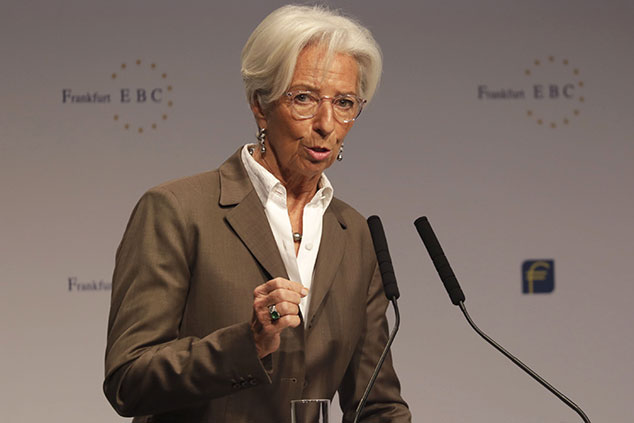
This article is taken from our FREE daily investment email Money Morning.
Every day, MoneyWeek’s executive editor John Stepek and guest contributors explain how current economic and political developments are affecting the markets and your wealth, and give you pointers on how you can profit.
Just back in the office this morning after a fantastic day at the MoneyWeek Wealth Summit on Friday.
Merryn and I both agreed it was the best we’ve done yet. If you made it along, I hope you enjoyed it and it was nice to get to speak to so many readers in person.
If you didn’t make it along, don’t despair – we’re already putting together plans for next year. Watch this space.
Now back to today. While we were all off at the summit on Friday, someone else was taking to the stage in Brussels. One Christine Lagarde.
And her speech gives us a pretty good idea of what’s coming next in the eurozone…
“The sovereigntists have lost”
Christine Lagarde has taken over from Mario Draghi at the European Central Bank (ECB).
Lagarde is not a central banker by vocation or by background. But she doesn’t need to be. Because that’s not going to be her job at the ECB. And that’s something she made clear with this speech.
During his time at the helm, Draghi managed to push the ECB towards being more like a “normal” central bank, despite resistance. In effect, he created a central bank that is capable of underpinning the eurozone financial system in the same way that the US Federal Reserve or the Bank of England or the Bank of Japan can underpin their financial systems. That is, by printing money.
That was the outcome of the Greek crisis. Greece was crushed by deflation; that was the sacrifice that the Greek people made – that was demanded of them – to stay in the euro. But in the meantime, terror of the whole house of cards collapsing meant that Draghi was simultaneously given a green light to “do what it takes”.
That’s what he did. And as far as he’s concerned, he did enough. As Russell Napier pointed out to us all at the MoneyWeek conference on Friday, when Draghi gave his valedictory (and somewhat self-congratulatory) interview to the Financial Times, he was paraphrased as saying that “the sovereigntists have lost”.
Quite the declaration of confidence.
But Draghi’s creation of a genuinely eurozone-wide central bank was just the first step. There’s a creeping realisation – stronger in some nations than others – that sharing a currency means giving up political power. Now it’s Lagarde’s turn to push that further, towards ever-closer political union.
She’s not a central banker, she’s a politician. And under her, you can expect the ECB to become even more political than it is now. In her first speech, she told governments that it’s time to get spending. Monetary policy “cannot and should not be the only game in town.”
In effect, she’s pushing harder on the door that Draghi already opened – the ECB is here, it’s printing money, and it will continue to buy all the bonds you can issue in order to fund more government spending. Meanwhile, progress towards “ever closer union” will continue.
As Helen Thomas of Blonde Money succinctly puts it, “Draghi effected political change but cloaked it under economics. Lagarde is going to do more, and in plain sight”.
One asset that is probably set to earn its place in your portfolio
So what does that all mean for your money?
The first question of course is: will Lagarde succeed? The answer is that I suspect she will. Brexit has made the federalist movement within the eurozone far less shy of admitting exactly what it wants – a Europe that is bound much more closely together than currently is the case.
To get there politically, what’s ultimately needed is a much softer currency. That’s how you tame the unrest in the less fiscally responsible countries (of whom France is the de facto leader). To do that, you need to get past objections from the more fiscally responsible countries (Germany, basically).
But the objections on that front are being steadily chipped away. And the beauty of Brexit for the Lagardes of this world, is that it enables a false polarisation of attitudes – if you’re not fully on board with further integration, you might as well be a continental Brexiteer, and there’s nothing in between.
What is the knock-on effect? Once German resistance is worn down (which may take a while), you get money printing in the eurozone. And when you’ve got all governments across the globe committing to spending more – or at the very least, under great pressure to do so – the obvious asset to own is gold.
As Bridgewater’s Ray Dalio reminded us all recently, “gold is the only asset you can have that’s not somebody else’s liability.”
We’ve discussed the purpose gold serves in your portfolio here several times and it came up again regularly at the conference on Friday. But if you’re looking for more on the hows and whys of buying it, then have a read here.